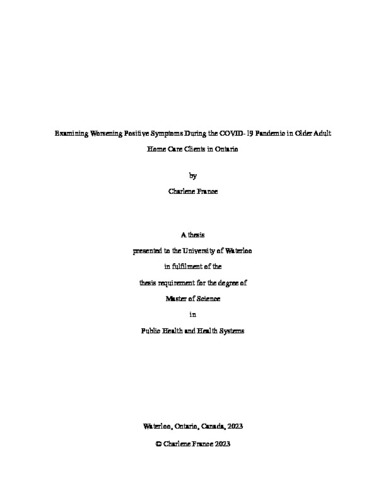| dc.description.abstract | Background: In response to the COVID-19 pandemic, lockdown restrictions were implemented to minimize the spread of infection. Older adults over the age of 60 account for majority of COVID-19-related deaths, hospitalizations, and intensive care admissions (Government of Canada, 2023). Thus, since the beginning of the pandemic, older adults were a vulnerable cohort with a high-risk of mortality.
Older adults with a mental disorder may be even more vulnerable to worsening physical health and mortality, as well as may experience greater psychological distress or a relapse in symptoms of their diagnosis due to social isolation and loneliness experienced during the pandemic. Research highlighting the pandemic effects on the general population of older adult psychological health have had mixed results. It is not well understood how the pandemic has affected positive symptoms of older adults with mental disorders. Objectives: The goal of part I of this paper was to identify and synthesize existing literature focusing on older adults with mental disorders, their experience throughout the COVID-19 pandemic, and the outcomes that have been researched in this realm. The goal of part II of this paper was to explore the changes of positive symptoms prior to and during the COVID-19 pandemic on older adults experiencing mental disorders in Ontario, and to examine risk factors that make them prone to experiencing worsening positive symptoms. Methods: Part I consisted of a rapid review and critical appraisal of the current research on older adults with mental disorders and COVID-19. Five electronic databases (PubMed, MEDLINE, Scopus, CINAHL, and PsycINFO) were searched. Part II entailed secondary data analysis using Ontario interRAI HC collected between September 1, 2018, to August 31, 2022. The sample was divided into four subsamples, “Pre-COVID,” “COVID Year 1,” “COVID Year 2,” and “COVID Year 3,” to conduct bivariate analyses. Bivariate analyses guided the development of three binary logistic regression models that were selected with modified stepwise selection. The final multivariate model determined predictors of worsening positive symptoms at time two for the total sample. Two additional models explored stratified logistic regression models of anti-psychotic use. Results: 40 studies were included in part I of this study. The results revealed that majority of existing research has been conducted from older adults with depression, in the first year of the pandemic, where the outcome was mood symptoms effected by social isolation in a variety of study settings. In part II of this study, risk of worsening positive symptoms was found to be associated with several variables. Variations in risk factor was present in main effects from the final model through LHIN region, higher MAPLe & CHESS scores, financial trade-offs, exercise, medication adherence, and difficulty sleeping, indicating that these factors had considerable associations with worsening positive symptoms prior to, and during the pandemic. Delirium and anti-psychotic use remained consistent prior to and during the pandemic in the COVID interactions. Older adults aged 64-75 with a diagnosis of schizophrenia had a AOR of 9.99 (reference = 18-64 and no mental illness). Variations of these risk factors were also found in the stratified logistic regression models of anti-psychotic use. Conclusion: Existing literature points to the pandemic leading to adverse health outcomes for older adults with mental disorders. Age-related risk factors and mental disorders were found to be of notable concern for worsening of positive symptoms, however, these factors may not have been exacerbated due to the COVID-19 pandemic. Future research is still needed to unpack this further. | en |

